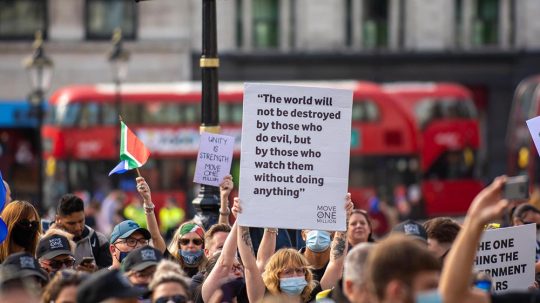
Aaron:I'm here today with Jonathan Cooper, a human rights specialist, activist and barrister with experience before English and international courts. How are you, Jonathan?
Jonathan Cooper: I'm good, very nice to be here with you Aaron.
Aaron :Great, thank you very much for being here. Could you tell us a bit about what led you to become an activist for human rights?
Jonathan Cooper: I came of age in the age of AIDS. And it was just very clear from that experience and my experience of what happened to me and my friends, that the UK system of government and then sort of increase the kind of global world order, just doesn't protect human rights effectively enough. And so I feel very involved in that crisis and worked very deeply within it, to try to have a human rights response to it. And in fact, it's the same with this pandemic, with any pandemic, the only way in which you are going to overcome them is by a human rights response.
Aaron: I just wondered if you might elaborate a tiny bit further on, for somebody who perhaps is less familiar with human rights, what a human rights-based approach looks like, in regards to HIV?
Jonathan Cooper: The key to a successful approach, human rights approach, is that you put the dignity of everyone upfront and you then build an approach that is about guaranteeing and enhancing and then securing that dignity. And you do that then using, with the right to dignity, but also specific and particular rights. So if you take the AIDS crisis as we're talking about it, you guarantee the rights of sort of personal autonomy through what we will probably call private life rights to everyone affected by HIV, you ensure that they have effective family life rights and association rights to push for their further human rights protection. And you know the biggest, it goes hand in hand with dignity, no discrimination, and the commitment to equality.
Aaron : Could you explain our right to dignity, and what's your assessment on how the UK fares in upholding it?
Jonathan Cooper: Human dignity is literally recognising the individual worth of all of us. That individual worth is as important as the collective worth. Therefore, we can't treat people differently, simply on the basis of who they are or where they come from, we recognise each and everybody's genuine value. Those in power say it's a kind of concept that's unfamiliar to English law or English culture or English or British UK identity, which is of course absurd because the idea that human dignity would be culturally specific is crazy. You have as equal human dignity, wherever you are in the globe, whether you're in Kazakhstan or Kensington, it doesn't matter.
Aaron: And so it's been more than 20 years since the introduction of The Human Rights Act, how would you assess its effect on the UK?
Jonathan Cooper: It's done exactly what we hoped it would do. It's just really really improved the nature of decision-making. The concept of accountability. You know, before it entered into force, it really, there was no really effective way of holding those that made decisions over your lives accountable. And now everyone recognises that it's good to be accountable. And the Human Rights Act has done that. And obviously, in relation to the individual rights, it's been very effective, you know, we have a proper right to protest now, we have better procedures in relation to investigations into use of lethal force. It's guaranteed us rights that we didn't have before and it's absolutely enhanced the rights that we already have. It's very hard to see what it is that you would want to change about it unless you don't want effective accountability.
Aaron: What's your view on the government's plans to update The Human Rights Act?
Jonathan Cooper: It's such an ingenious scheme, that we should use it and apply it to get better and more enhanced protections. So in relation to economic and social rights, would be the obvious one. But also environmental protection should fall under the same scheme. And so you can imagine a sort of three pillars to the way in which we hold the state and power to account. One will be The Human Rights Act. The other will be The Environmental Rights Act. And the third will be the act of protecting all sentient beings. And so there would obviously be a relationship between the three pillars, but then you would really have proper protection in law across the board.
Aaron:Thank you so much again for your time.
Jonathan Cooper: Brilliant, thanks so much Aaron, bye.



